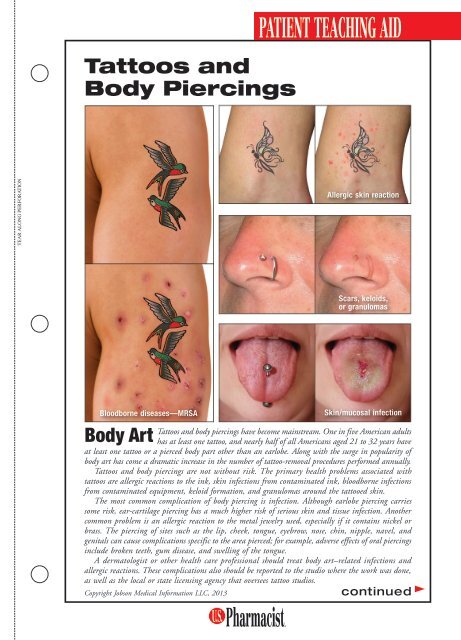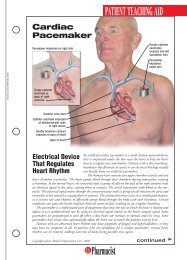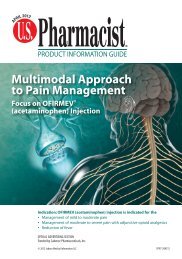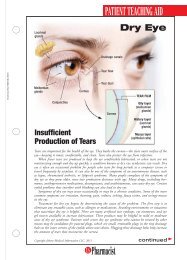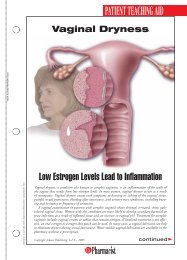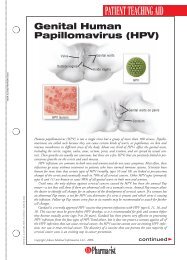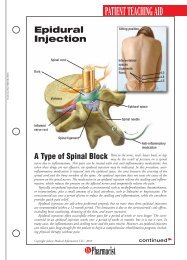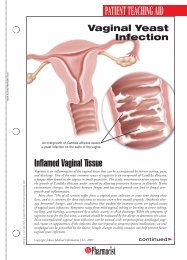Tattoos and Body Piercings pdf - U.S. Pharmacist
Tattoos and Body Piercings pdf - U.S. Pharmacist
Tattoos and Body Piercings pdf - U.S. Pharmacist
You also want an ePaper? Increase the reach of your titles
YUMPU automatically turns print PDFs into web optimized ePapers that Google loves.
<strong>Tattoos</strong> <strong>and</strong><strong>Body</strong> <strong>Piercings</strong>PATIENT TEACHING AIDTEAR ALONG PERFORATIONAllergic skin reactionScars, keloids,or granulomasBloodborne diseases—MRSA<strong>Body</strong> Art<strong>Tattoos</strong> <strong>and</strong> body piercings have become mainstream. One in five American adultshas at least one tattoo, <strong>and</strong> nearly half of all Americans aged 21 to 32 years haveat least one tattoo or a pierced body part other than an earlobe. Along with the surge in popularity ofbody art has come a dramatic increase in the number of tattoo-removal procedures performed annually.<strong>Tattoos</strong> <strong>and</strong> body piercings are not without risk. The primary health problems associated withtattoos are allergic reactions to the ink, skin infections from contaminated ink, bloodborne infectionsfrom contaminated equipment, keloid formation, <strong>and</strong> granulomas around the tattooed skin.The most common complication of body piercing is infection. Although earlobe piercing carriessome risk, ear-cartilage piercing has a much higher risk of serious skin <strong>and</strong> tissue infection. Anothercommon problem is an allergic reaction to the metal jewelry used, especially if it contains nickel orbrass. The piercing of sites such as the lip, cheek, tongue, eyebrow, nose, chin, nipple, navel, <strong>and</strong>genitals can cause complications specific to the area pierced; for example, adverse effects of oral piercingsinclude broken teeth, gum disease, <strong>and</strong> swelling of the tongue.A dermatologist or other health care professional should treat body art–related infections <strong>and</strong>allergic reactions. These complications also should be reported to the studio where the work was done,as well as the local or state licensing agency that oversees tattoo studios.Copyright Jobson Medical Information LLC, 2013Skin/mucosal infectioncontinued
PATIENT TEACHING AID<strong>Body</strong> Art Is Not Without Health Risks<strong>Tattoos</strong> <strong>and</strong> body piercings have become increasingly popular. Itis important to be aware of the complications that can result,however.<strong>Tattoos</strong> <strong>and</strong> Their ComplicationsTo create a permanent tattoo, the tattoo artist punctures the toplayer of the skin <strong>and</strong> inserts small drops of ink beneath the surface,usually with a h<strong>and</strong>-held machine. If the tattooed area isb<strong>and</strong>aged, the b<strong>and</strong>age should be removed after 24 hours <strong>and</strong>an antibiotic ointment applied after the area is cleansed withmild soap <strong>and</strong> water. A moisturizer may be applied to keep theskin soft. Direct sunlight <strong>and</strong> swimming should be avoided for several weeks.Because tattoos <strong>and</strong> body piercingsbreach the skin, infections <strong>and</strong>other complications can occur.The most common complications of permanent tattoos are allergic reactions <strong>and</strong> infection. Allergicreactions to the ink, such as itching <strong>and</strong> redness, can occur long after the tattoo is healed. Thetattooed skin can become infected, resulting in scarring <strong>and</strong> ruining the tattoo. Contaminated inkcan cause a skin infection. Less commonly, needles contaminated with infected blood can transmitbloodborne diseases such as hepatitis, tetanus, <strong>and</strong> HIV. Raised scars (keloids) <strong>and</strong> small, permanentlyraised bumps (granulomas) may form. MRI imaging can cause the tattooed area to swell because ofthe metals contained in some inks.Tattoo removal can be a lengthy, expensive process, <strong>and</strong> results may be less than ideal. A tattoomay be removed by dermabrasion (“s<strong>and</strong>ing” the skin), laser surgery, or surgically removing the tattooedarea <strong>and</strong> stitching together the surrounding skin. A dermatologist trained in tattoo removalcan determine the best procedure based on ink color, skin color, size, <strong>and</strong> location.<strong>Body</strong> Piercing <strong>and</strong> Its ComplicationsIn body piercing, a hole is made in the skin <strong>and</strong> decorated with a metal stud or other jewelry. Earlobesare usually pierced using a piercing gun with a sterile, prepackaged earring stud attached. Other areasof the body are pierced with a sterile, hollow needle, <strong>and</strong> the stud or jewelry is inserted through thehole by h<strong>and</strong>.The most common complication of body piercing is infection, which can cause pain, redness,swelling, or discharge in the area pierced. The presence of any of these symptoms requires a promptvisit to a health care professional, who may prescribe an oral or topical antibiotic. Another complicationis an allergic reaction (redness, swelling, or itching) to the stud or jewelry.To prevent infection, the piercing should be performed by a professional body piercer. Proper h<strong>and</strong>washing, disposable gloves, disposable needles, <strong>and</strong> sterilized tools should be st<strong>and</strong>ard in a reputablepiercing shop. Aftercare includes cleansing with soap <strong>and</strong> water or an antibacterial cleansing solution,with gentle movement of the stud or jewelry to keep it from adhering. Oral piercings require use ofan antibacterial mouth rinse.To prevent allergic reactions, only studs or jewelry made of surgical steel, 14-karat gold, or titaniumshould be used. Nickel- <strong>and</strong> brass-containing metals are most likely to cause allergic reactions.Considerations Regarding <strong>Body</strong> ArtAny reaction to tattoos or body piercing should be evaluated <strong>and</strong> treated by a dermatologist or otherhealth care professional. Accurate diagnosis of a skin or tissue infection is important because extendedtreatment with antibiotics may be necessary.<strong>Body</strong>-art procedures should always be performed by a trained tattoo artist or body piercer in alicensed studio that follows local or state health department regulations. <strong>Tattoos</strong> should be consideredpermanent because removal may not be completely successful, <strong>and</strong> the procedure is time-consuming<strong>and</strong> expensive. Ask your doctor before getting a body piercing or tattoo if you have diabetes, takesteroids or blood thinners, or have a chronic disease that suppresses immunity.


